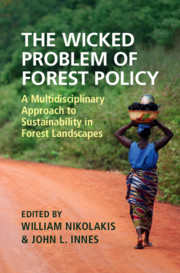 The Wicked Problem of Forest Policy
The Wicked Problem of Forest Policy Book contents
- The Wicked Problem of Forest Policy
- The Wicked Problem of Forest Policy
- Copyright page
- Contents
- Contributors
- 1 The Wicked Problem of Forest Policy
- Part I Wicked Problems and Policies
- 2 Why Forests Matter?
- 3 Forest Certification and Forest Use
- 4 REDD+ Meets Local Realities
- 5 Have Payments for Ecosystem Services Delivered for the Rural Poor?
- 6 Tackling Gender Inequality through Forest-Related Policies and Programmes
- 7 Forestry Crimes and Our Planet
- 8 Forest Bioeconomy Development
- Part II Tools to Address Wicked Problems
- Index
- References
6 - Tackling Gender Inequality through Forest-Related Policies and Programmes
Global Challenges, Multi-scale Innovations and Local Experiences
from Part I - Wicked Problems and Policies
Published online by Cambridge University Press: 24 July 2020
- The Wicked Problem of Forest Policy
- The Wicked Problem of Forest Policy
- Copyright page
- Contents
- Contributors
- 1 The Wicked Problem of Forest Policy
- Part I Wicked Problems and Policies
- 2 Why Forests Matter?
- 3 Forest Certification and Forest Use
- 4 REDD+ Meets Local Realities
- 5 Have Payments for Ecosystem Services Delivered for the Rural Poor?
- 6 Tackling Gender Inequality through Forest-Related Policies and Programmes
- 7 Forestry Crimes and Our Planet
- 8 Forest Bioeconomy Development
- Part II Tools to Address Wicked Problems
- Index
- References
Summary
Addressing gender inequality is a core goal in the global development agenda. Gender inequality in forest landscapes is a ‘wicked problem’, where deep-seated socioeconomic and ideological causes are difficult to recognize and address, not only because they are context- and culture-specific across and even within countries, but also because they involve multiple (male and female) stakeholders with different and sometimes conflicting interests and different positions within power hierarchies. The alliances and tensions inherent in such complex stakeholder relationships may work with or against other desirable forest outcomes, and defy simple or superficial solutions. In this chapter, three forest policies are examined through the lens of gender equality: the devolution of forest management to local communities; payments to communities for sustaining forest-based global public goods; and forest certification. These policies have generated positive gender equality outcomes, but these also (re)produce gender discrimination through formal and informal institutions. More holistic approaches are required to address gender inequality in forest policies, which directly target gender and social relations, and strengthen women’s participation in forest governance.
- Type
- Chapter
- Information
- The Wicked Problem of Forest PolicyA Multidisciplinary Approach to Sustainability in Forest Landscapes, pp. 167 - 196Publisher: Cambridge University PressPrint publication year: 2020
